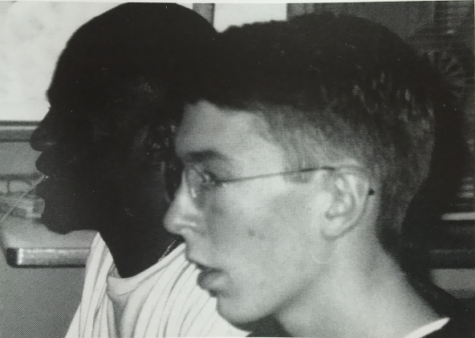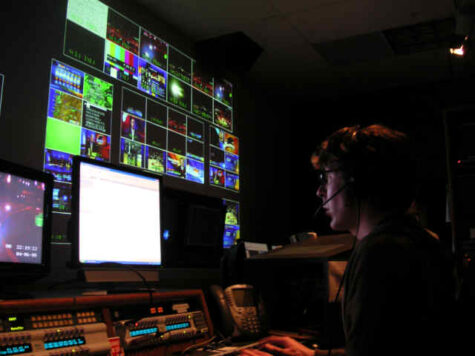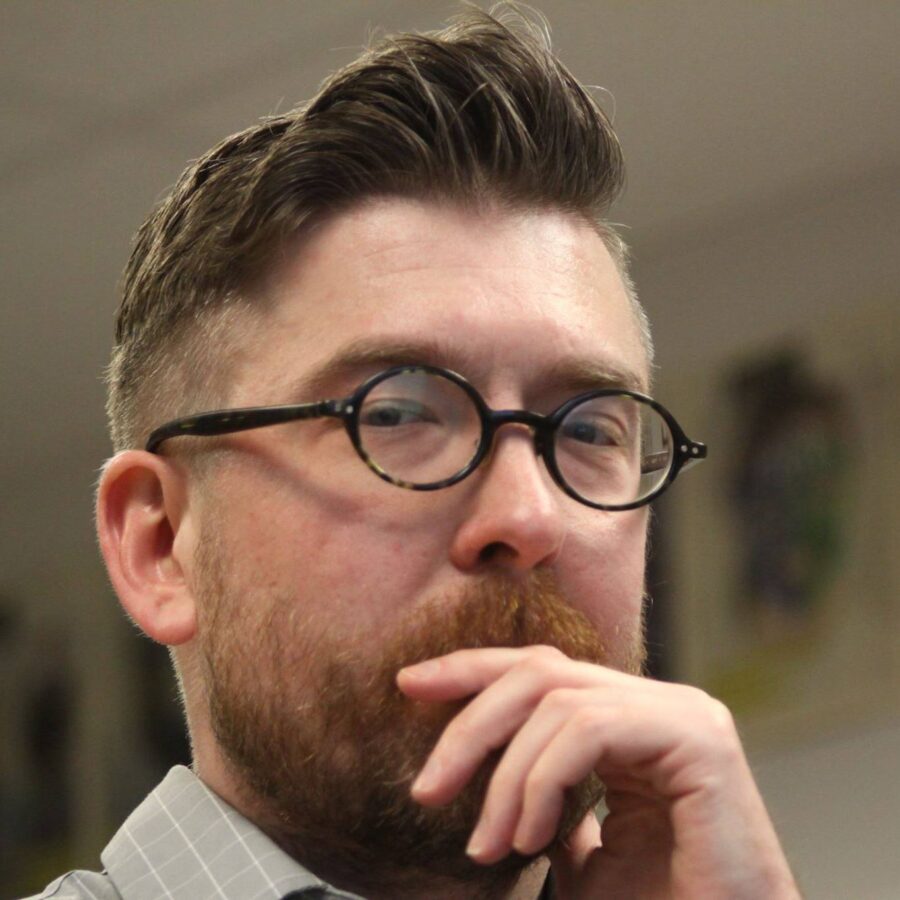Scott Collins
Journalism Teacher
Biography
University of Missouri: BA, Journalism, magna cum laude
University of Oregon: Master of Education
- Previously taught at Raytown High School in Raytown, MO and Oak Hill School in Eugene, OR
- Worked as a television news producer at KGW-TV in Portland and at Northwest Cable News in Seattle
Background: Mr. Collins helped me organize this project, and his was the first interview I conducted. I loved hearing his thoughts on journalism, identity, and teaching.
How did you come to journalism? What made you want to be a journalist?
I got interested in journalism around 8th or 9th grade. For some reason, I became obsessed with the local NBC station. It was a new station, and was just getting off the ground. I was watching all their newscasts and thinking about how I would do things differently. One of the local news anchors—from the Fox station, actually—came into my sister’s job. My sister was like, “my brother is obsessed with local news,” and the news anchor gave my sister her card. So, I got to spend the day at the local TV station and see behind the scenes.
That interest incubated during high school. I knew I wanted to go to college and study journalism. By my senior year, I was like, “oh, wait, maybe I should take a journalism class!” I loved it and went on to study broadcast journalism in college.
How did you come to UPrep?
I worked in Journalism for a while and decided I wanted to do something different—I wanted to teach. I started teaching English, but my goal was to find a journalism job. One opened at the high school I graduated from. I taught there for a couple years. It was a stressful job—I’m glad I had it, but I would have burnt out if I stayed there. Then one day I got an update from the Journalism Education Association saying there was a journalism job open at Uprep, in Seattle. I was like, “I’ve lived in Seattle before!” and I decided to apply.
I remember the night I stayed up writing the cover letter for the job and thinking: “yes, I nailed it.” Still, I was amazed and surprised when I got the job. I’m so glad—I love the job that I have. This year has proven it. I just love working with student journalists and seeing them realize the power of journalism. I love having their work be so public. I love working with the same students for multiple years. At Uprep, that’s common across disciplines, but at my last school we had 1600 kids, so the fact that I had some of them for three years was pretty special. I got to really know them and watch them grow.

What was high school like for you, and how does that shape the way you teach?
I was very much like a Uprep student. I was obsessed with grades. Now, I wonder: “why the hell did I do that?!” I want to tell all of you: “None of it matters! No one’s going to ask what you got on your physics test when you’re 27 years old.” I try not to put that stress on my students.
Being a teacher has forced me to take a step back and consider the perspective of disengaged students. I was a super motivated student, so sometimes I’m like, “kids these days! Back in my day, we always did the assignments, blah blah blah.” Then I realize that I was in all honors classes, surrounded by overachievers. Some kids didn’t do their work in 1999, just like some kids don’t do their work now. I need to try to understand where they’re coming from.
My high school experience also effects how I teach English. When I was a student, I knew how to write; I was gifted with that ability. But I never understood analyzing literature. I thought, “this is stupid, there’s no deeper meaning”—the same thing I hear students say all the time. Since that was my attitude to literature in high school, I knew how to teach analyzing literature way better than I knew how to teach writing. With writing it was like, “just do it! I don’t understand what the problem is.”
I feel obligated to ask, now: why do we analyze literature?
Writing about other people’s writing makes you a better writer, and a better critical thinker.
Ever since I went to grad school and learned to teach English, when I read personally—I don’t break out a pen and annotate—but I think more about what I’m reading. I look at word choice. This awareness is important for journalism. Students should study how articles are structured, what voices are left in and what voices are left out. I don’t want students to take anything at face value, I want them to push themselves and really understand the reasons behind things. Although as an adult you’re probably not going to analyze literature much, the skill of seeing where someone’s coming from and breaking down their ideas—I think that is the value of teaching literary analysis.

To me, it seems like a lot of people blame today’s polarized politics on biased media. Do you think that’s true? Do you have any advice for us, as young consumers of information?
I think it’s definitely true.
As someone with a liberal leaning, I do blame Fox News. However, the same kind of bias can happen on the left. MSNBC used to be a straight news channel. CNN used to have fewer opinion shows.
I think what makes it even worse is that we now can filter our news. There used to be only three network channels and CNN. Now you get to decide what’s in your twitter feed, what you consume. That selective consumption drives people apart.
I have a couple pieces of advice for news consumers, a couple things that I do.
One, it is important for you to be critical of the sources you like. Look for biases that support your ideas. I believe in old fashioned, down the middle journalism, so when I hear something that I agree with, that might be liberal bias, I get critical of it. I take things with a grain of salt.
I also consume news from other perspectives. Often, bias can be found in story selection. Which stories get told? Which don’t? It’s good to look at sources from many perspectives so you’re not just in your own echo-chamber.
Another thing that I do—though I don’t know that I recommend this—is reading the comments on news articles. It exposes me to how other people view things. I’m like, “I don’t agree with you, but I see your perspective now.” I think that’s important. We don’t have to agree, in fact you can vehemently disagree, but if you can understand where they’re coming from, it makes it a little bit easier for us to be less polarized.
Lately I’ve been realizing how vastly beliefs and values can differ, between different people, but also over time. How do the beliefs you hold now compare to the beliefs you had when you were my age?
I don’t feel like there’ve been any radical 180’s. The changes in my worldview have been caused by a deepening of beliefs and a widening of perspectives.
I’ve gotten more exposure to a variety of people and places. I never thought I would leave the Midwest. I went to college two hours away from the city I grew up in, and I envisioned myself working at that NBC station at home. My life didn’t turn out that way at all. I ended up in the Northwest, then back in the Midwest, then back in the Northwest. It’s helped me see—not even huge belief shifts, but things like mountains. That may not sound profound, but mountains are not a thing in Kansas City. I would not even ponder their existence. Here, they’re beautiful.
Politically, I’m pretty much where I was in high school, maybe slightly more to the left, although my beliefs on religion have changed a lot. I was raised Catholic and hated it, but I could also understand it. It wasn’t like I didn’t believe in God. In college and young adulthood, I got really into religion. I still disagreed with a lot of Catholic church, but I was keyed into the spiritual aspects. I now consider myself agnostic, but I hate it when people bash on religions. Just pause and think—if other groups have a right to religious freedom, Christians should, too.
In high school I was still figuring myself out. I wasn’t out to myself or anybody else. Obviously, that’s changed. But even as a high schooler, I was like, “I don’t understand why gay people can’t have rights.”
Would you mind sharing a bit about your experiences as part of the LGBTQIA+ community?
I consider myself fortunate. I was born on the cusp of it being really hard to be gay, and it being super easy to be gay. I remember the AIDS crisis and what that was like. I didn’t identify as LGBT at that time, but my awareness of it was there. For people born today, it’s a completely different world. AIDS isn’t even on their radar.
Sometimes I wish I had come out earlier. I wasn’t sure about things in high school, and still wasn’t sure in college. But my senior year, I was like “yeah, this is this.” But I still only told one friend. I just sort of sat on it.
I moved to Seattle after school and didn’t really tell anyone here, but I was more comfortable with it myself. Then I moved to Portland and ended up in a relationship, and that was my way into coming out to everybody. It was easier for me to say, “I’m dating this guy” than to say, “by the way, I’m gay.” It helped me be more comfortable with myself and publicly identify as queer.
My boyfriend and I had been together for a while when I got into work one day, and my cell phone rang. It was my older sister. She said, “hey, I have a question: is Mike your boyfriend?” And I was like, “uuuummm . . . yes?” And she was like, “d’you want to know how I knew? I figured it out my looking on myspace” (an early form of social media.) I was like, “ok, well I’m at work, so we’ll talk about this later, bye!” I immediately sent my boyfriend a joking email, saying, “we’ve been found out!”
It was well timed. I was approaching the point where I would be coming out to my family, but this forced me to, in a good, gentle way. I went home soon after that and talked to my two other siblings about it. That went fine. But I couldn’t get up the guts to talk to my parents. Finally, at the end of the trip, they took me to the airport to fly back to Portland. In the middle of the airport, I was like, “so . . . there’s something I need to tell you before I go.” Again, I think I went with, “Mike is my boyfriend.” There was a silence, and my Mom was like, “that’s fine, we just want you to be happy.” My dad didn’t say much—just a silent reaction. Later they would both be fully supportive. Then I went through security. So that was my weird coming out to my family.
Since then, it’s become natural to mention. However, I wasn’t out to my students at my last job. It was a more conservative area, so I kept it to myself and my coworkers. I talked about it in my interview process for Uprep, because I knew it would be accepted, but still wasn’t sure I was going to say anything to students. One day the editor of the newspaper said something to me about a female actress. I replied: “she’s not really my type.” And he was like, “what’s your type?” And I was like, “more male.” From there, there was no turning back. And I’m so glad.
Several of my students from my previous school are now friends with me on social media, so they’ve learned that I’m gay. It warms my heart whenever I post anything gay-related, and the kid who was, say, the quarterback of the football team, likes it. It’s just nice.
I met up with one of the former newspaper editors—who has now herself come out—and it made me regret not being out as a teacher at that school.
Overall, what do you want students to get out of your class?
Life is complicated. And answers are not easy.
I try to push my students to understand that stories don’t have two sides. Stories have many sides, and you can believe something with caveats. I want people to really appreciate the nuance of life, and to realize that it’s ok to be undecided about things. And, your opinions can change. Nuance, shades of grey, life is complicated, but that’s okay.
Is there anything else you want to say?
I wish students realized that they go to a really special school. The real world is not Uprep. I think that’s good, and I think that’s bad. I know it’s easy to complain about the school, I know it’s developmentally appropriate. But I hope that students will, at some point, be grateful for their experiences at Uprep.

